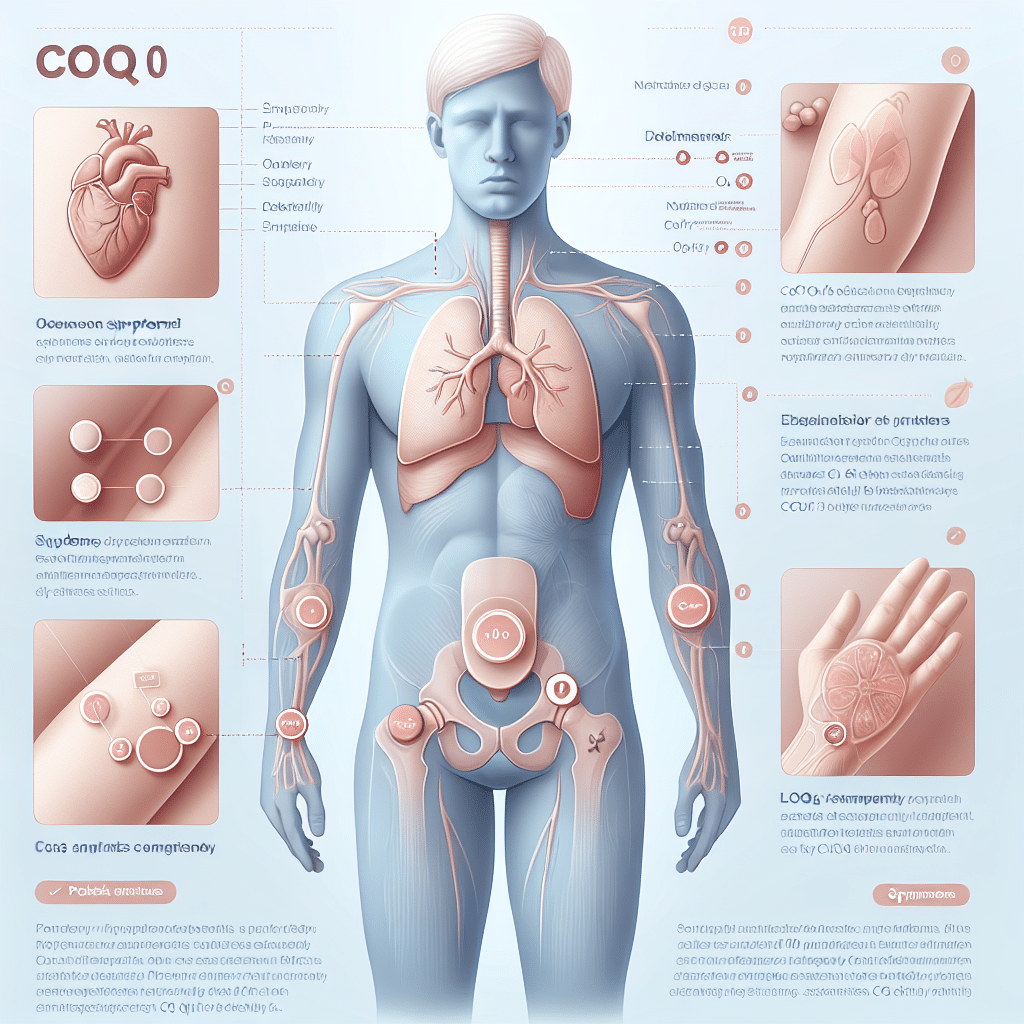CoQ10 Deficiency: Signs and Symptoms
-
Table of Contents
CoQ10 Deficiency: Understanding the Signs and Symptoms

Coenzyme Q10, commonly known as CoQ10, is a vital nutrient that plays a crucial role in the production of energy within our cells. It is a naturally occurring substance that functions as an antioxidant, protecting cells from damage and playing a part in the metabolism. Despite its critical role, CoQ10 deficiency is a relatively common issue that can lead to various health problems. In this article, we will explore the signs and symptoms of CoQ10 deficiency, its causes, and the potential health implications.
What is CoQ10?
CoQ10 is a fat-soluble compound found in every cell of the body. It is essential for the production of adenosine triphosphate (ATP), which is the primary energy currency of the cell. CoQ10 also serves as an antioxidant, helping to neutralize free radicals that can cause cellular damage. While the body can produce CoQ10 naturally, levels can decrease due to age, certain medical conditions, and the use of specific medications.
Signs and Symptoms of CoQ10 Deficiency
Identifying CoQ10 deficiency can be challenging, as the signs and symptoms are often nonspecific and can be associated with many other health conditions. However, some common indicators may suggest a deficiency in this critical nutrient:
- Fatigue and Weakness: Since CoQ10 is essential for energy production, a deficiency can result in a feeling of persistent tiredness and a lack of energy.
- Muscle Pain and Soreness: Unexplained muscle pain and discomfort may be a sign of CoQ10 deficiency, as the muscles require adequate energy to function correctly.
- Cognitive Dysfunction: Difficulty with concentration, memory, and overall cognitive function can occur due to the brain’s high energy demands.
- Cardiovascular Issues: CoQ10 plays a role in heart health, and a deficiency may contribute to conditions such as heart failure and hypertension.
- Immune System Weakness: As an antioxidant, CoQ10 supports the immune system. A deficiency may lead to increased susceptibility to infections.
Causes of CoQ10 Deficiency
Several factors can contribute to a decrease in CoQ10 levels, including:
- Age: Natural production of CoQ10 declines with age.
- Genetic Factors: Certain genetic conditions can impair the body’s ability to synthesize CoQ10.
- Medications: Statins, used to lower cholesterol, are known to reduce CoQ10 levels in the body.
- Nutritional Deficiencies: A diet lacking in CoQ10-rich foods, such as organ meats, fatty fish, and whole grains, can lead to lower levels.
- Medical Conditions: Diseases that affect CoQ10 absorption or utilization can result in a deficiency.
Health Implications of CoQ10 Deficiency
Long-term CoQ10 deficiency can have significant health implications. It has been associated with various medical conditions, including:
- Neurodegenerative Diseases: Conditions such as Parkinson’s and Alzheimer’s disease have been linked to low CoQ10 levels.
- Cardiovascular Diseases: Deficiency may contribute to heart failure, angina, and high blood pressure.
- Diabetes: CoQ10 is thought to improve insulin sensitivity and regulate blood sugar levels.
- Cancer: Some research suggests that CoQ10 may help to prevent or treat certain types of cancer.
Addressing CoQ10 Deficiency
Treatment for CoQ10 deficiency typically involves dietary changes and supplementation. Increasing the intake of CoQ10-rich foods and taking high-quality supplements can help restore normal levels. It is essential to consult with a healthcare provider before starting any supplementation, as CoQ10 can interact with certain medications and conditions.
Conclusion: The Importance of CoQ10
CoQ10 deficiency can lead to a range of health issues, from fatigue and muscle pain to serious chronic diseases. Recognizing the signs and symptoms is the first step in addressing this deficiency. With proper dietary choices and supplementation, it is possible to maintain adequate CoQ10 levels and support overall health and well-being.
Discover ETchem’s Protein Products
If you’re looking to support your CoQ10 levels and overall health, consider exploring ETchem’s range of protein products. Their high-quality collagens can complement your nutritional strategy for maintaining energy production and cellular health.
About ETChem:
ETChem, a reputable Chinese Collagen factory manufacturer and supplier, is renowned for producing, stocking, exporting, and delivering the highest quality collagens. They include marine collagen, fish collagen, bovine collagen, chicken collagen, type I collagen, type II collagen and type III collagen etc. Their offerings, characterized by a neutral taste, instant solubility attributes, cater to a diverse range of industries. They serve nutraceutical, pharmaceutical, cosmeceutical, veterinary, as well as food and beverage finished product distributors, traders, and manufacturers across Europe, USA, Canada, Australia, Thailand, Japan, Korea, Brazil, and Chile, among others.
ETChem specialization includes exporting and delivering tailor-made collagen powder and finished collagen nutritional supplements. Their extensive product range covers sectors like Food and Beverage, Sports Nutrition, Weight Management, Dietary Supplements, Health and Wellness Products, ensuring comprehensive solutions to meet all your protein needs.
As a trusted company by leading global food and beverage brands and Fortune 500 companies, ETChem reinforces China’s reputation in the global arena. For more information or to sample their products, please contact them and email karen(at)et-chem.com today.




